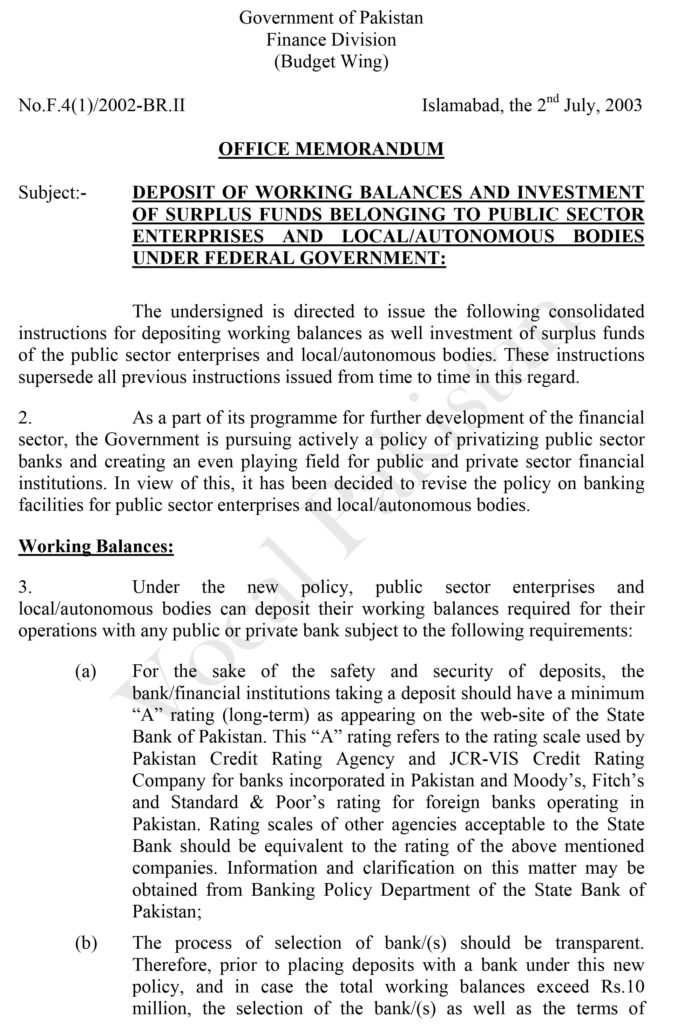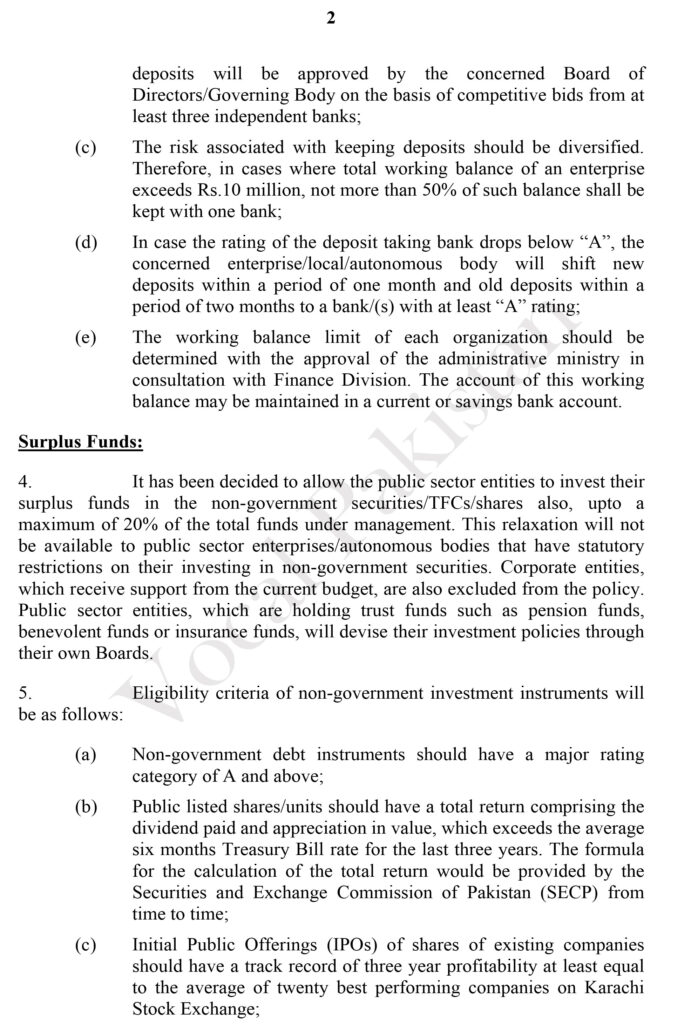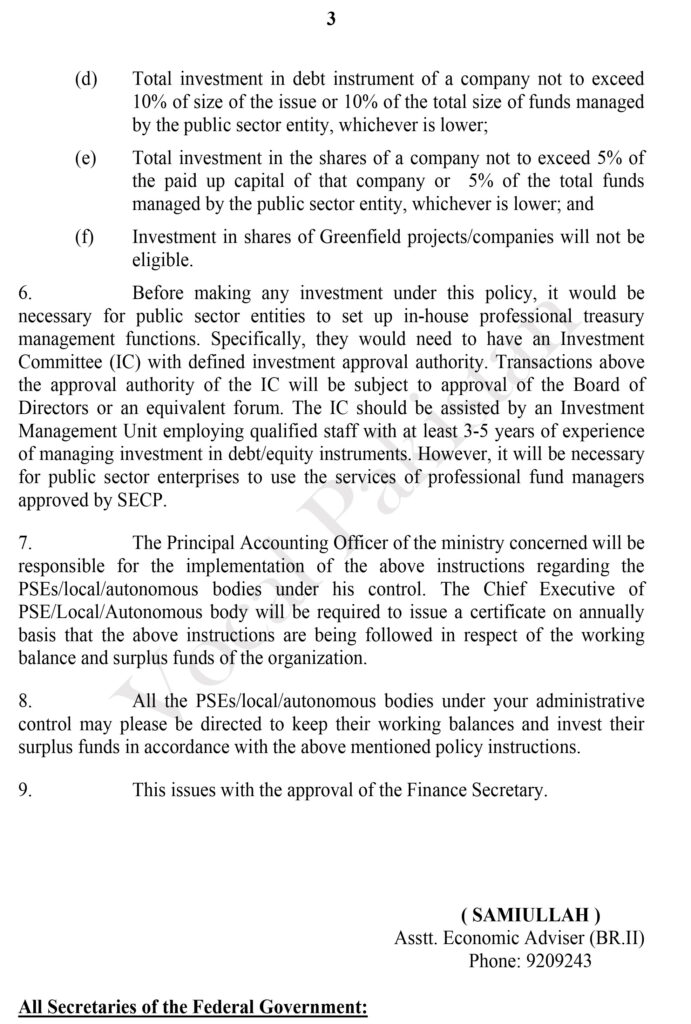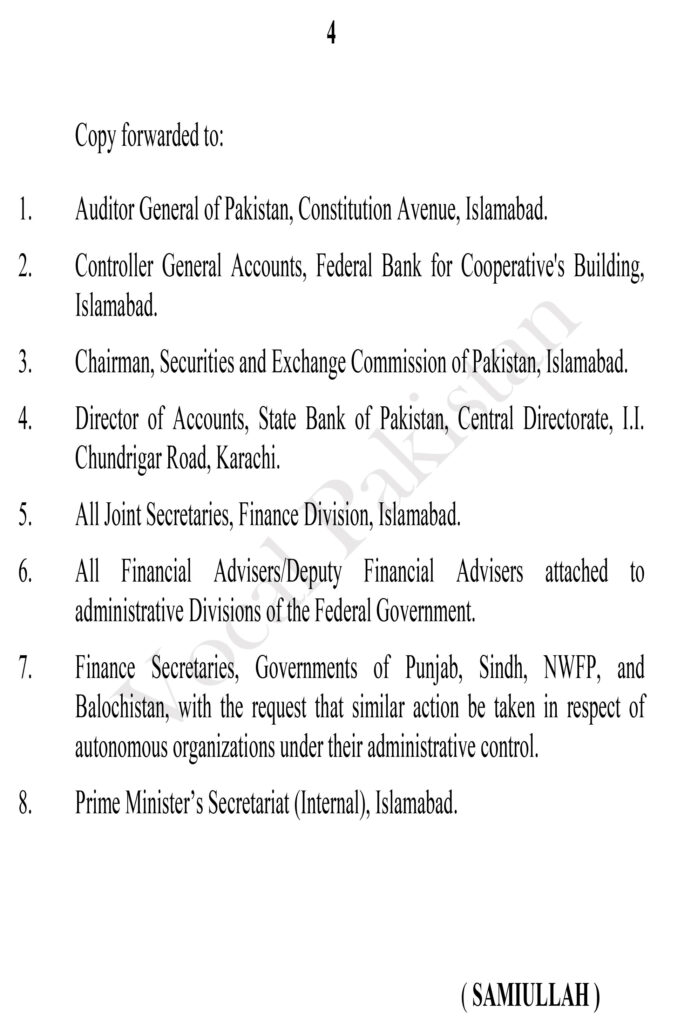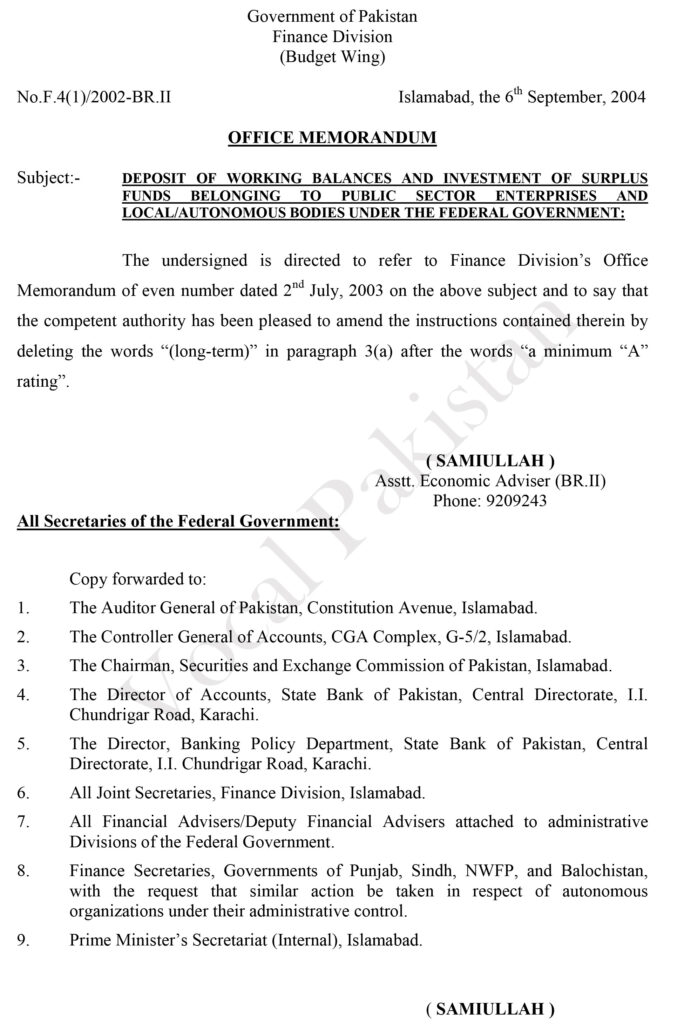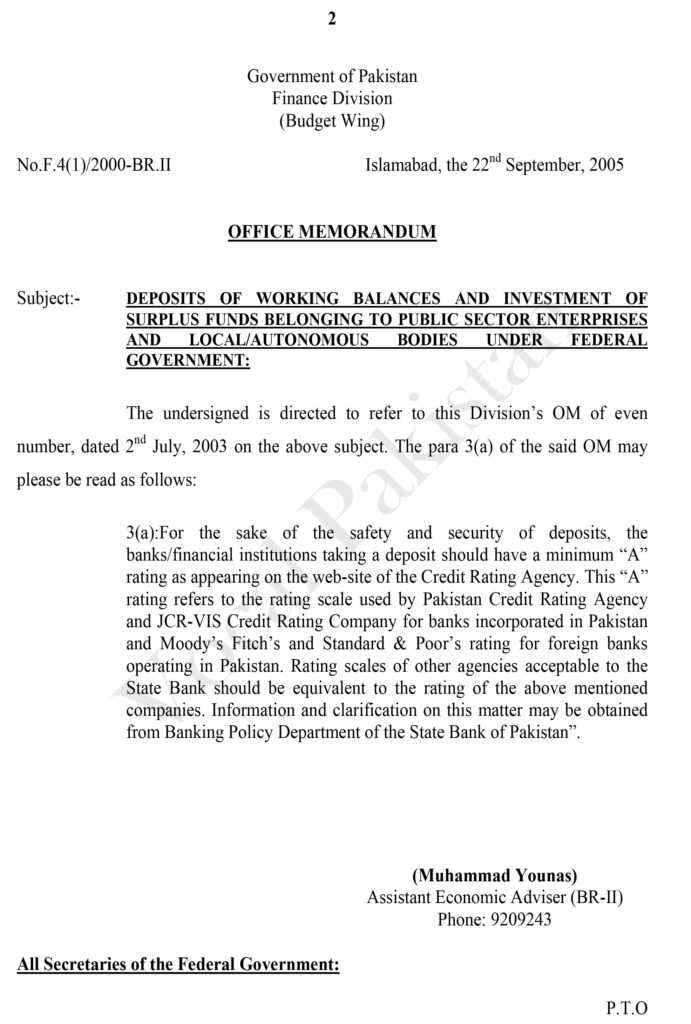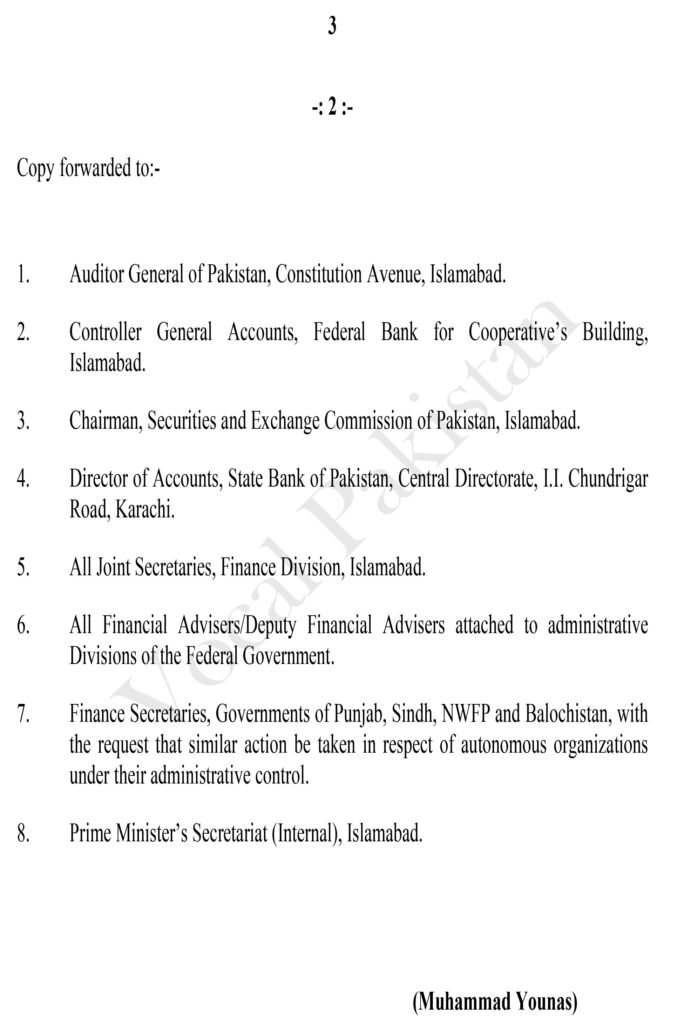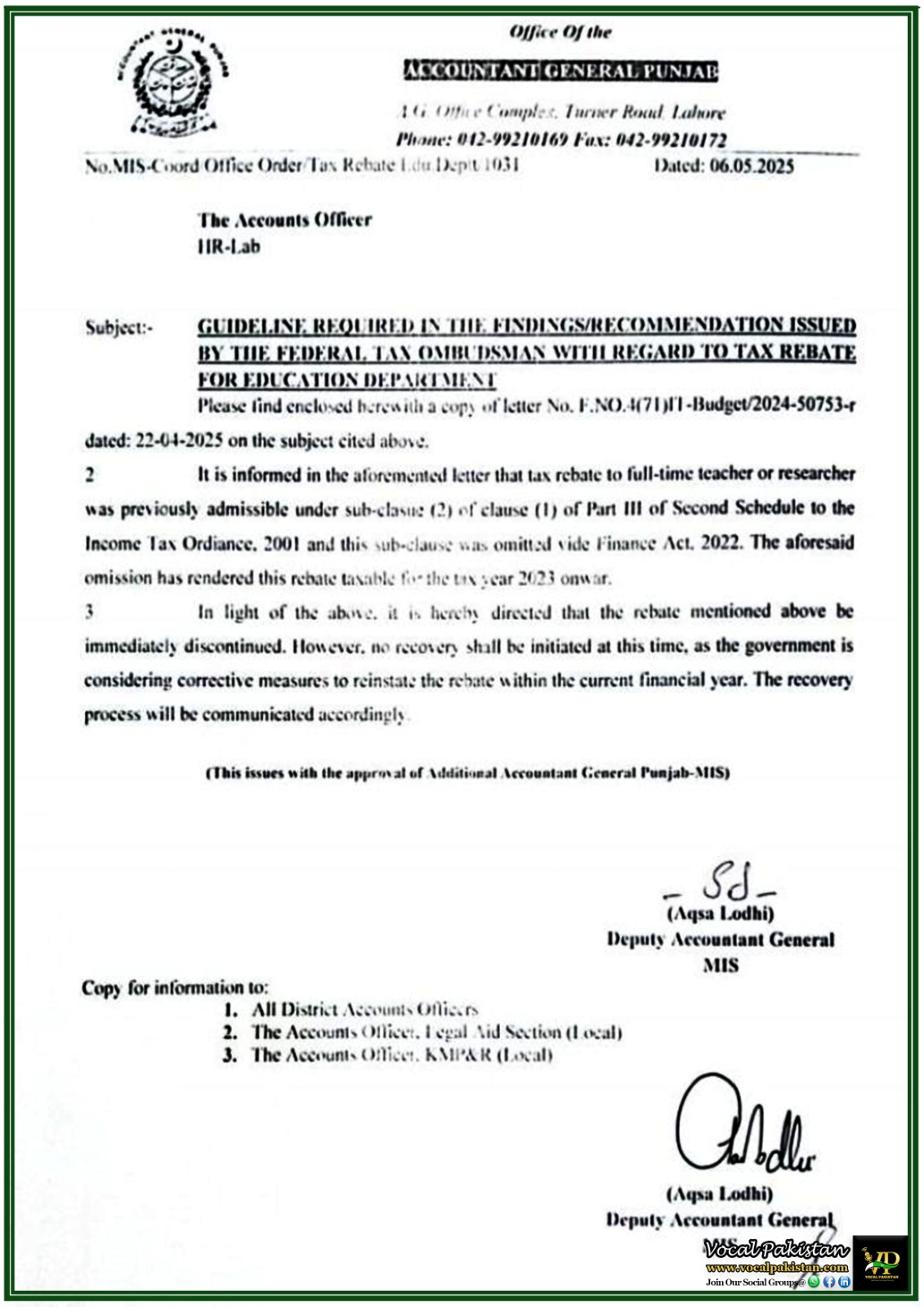Notification / OM No.
No.F.4(1)/2002-BR.II
Dated:
2-July-2003
Notification Issued By:
(BUDGET WING) FINANCE DIVISION, GOVERNMENT OF PAKISTAN
GOVERNMENT OF PAKISTAN
FINANCE DIVISION
(BUDGET WING)
No.F.4(1)/2002-BR.II
Islamabad, the 2nd July, 2003
OFFICE MEMORANDUM
Subject: DEPOSIT OF WORKING BALANCES AND INVESTMENT OF SURPLUS FUNDS BELONGING TO PUBLIC SECTOR ENTERPRISES AND LOCAL/ AUTONOMOUS BODIES UNDER FEDERAL GOVERNMENT:
The undersigned is directed to issue the following consolidated instructions for depositing working balances as well investment of surplus funds of the public sector enterprises and local/autonomous bodies. These instructions supersede all previous instructions issued from time to time in this regard.
2. As a part of its programme for further development of the financial sector, the Government is pursuing actively a policy of privatizing public sector banks and creating an even playing field for public and private sector financial institutions. In view of this, it has been decided to revise the policy on banking facilities for public sector enterprises and local/autonomous bodies.
Working Balances:
3. Under the new policy, public sector enterprises and local/autonomous bodies can deposit their working balances required for their operations with any public or private bank subject to the following requirements:
(a) For the sake of the safety and security of deposits, the bank/financial institutions taking a deposit should have a minimum “A” rating (long-term) as appearing on the web-site of the State Bank of Pakistan. This “A” rating refers to the rating scale used by Pakistan Credit Rating Agency and JCR-VIS Credit Rating Company for banks incorporated in Pakistan and Moody’s, Fitch’s and Standard & Poor’s rating for foreign banks operating in Pakistan. Rating scales of other agencies acceptable to the State Bank should be equivalent to the rating of the above mentioned companies. Information and clarification on this matter may be obtained from Banking Policy Department of the State Bank of Pakistan;
(b) The process of selection of bank/(s) should be transparent. Therefore, prior to placing deposits with a bank under this new policy, and in case the total working balances exceed Rs.10 million, the selection of the bank/(s) as well as the terms of 2 deposits will be approved by the concerned Board of Directors/Governing Body on the basis of competitive bids from at least three independent banks;
(c) The risk associated with keeping deposits should be diversified. Therefore, in cases where total working balance of an enterprise exceeds Rs.10 million, not more than 50% of such balance shall be kept with one bank;
(d) In case the rating of the deposit taking bank drops below “A”, the concerned enterprise/local/autonomous body will shift new deposits within a period of one month and old deposits within a period of two months to a bank/(s) with at least “A” rating;
(e) The working balance limit of each organization should be determined with the approval of the administrative ministry in consultation with Finance Division. The account of this working balance may be maintained in a current or savings bank account.
Surplus Funds:
4. It has been decided to allow the public sector entities to invest their surplus funds in the non-government securities/TFCs/shares also, upto a maximum of 20% of the total funds under management. This relaxation will not be available to public sector enterprises/autonomous bodies that have statutory restrictions on their investing in non-government securities. Corporate entities, which receive support from the current budget, are also excluded from the policy. Public sector entities, which are holding trust funds such as pension funds, benevolent funds or insurance funds, will devise their investment policies through their own Boards.
5. Eligibility criteria of non-government investment instruments will be as follows:
(a) Non-government debt instruments should have a major rating category of A and above;
(b) Public listed shares/units should have a total return comprising the dividend paid and appreciation in value, which exceeds the average six months Treasury Bill rate for the last three years. The formula for the calculation of the total return would be provided by the Securities and Exchange Commission of Pakistan (SECP) from time to time;
(c) Initial Public Offerings (IPOs) of shares of existing companies should have a track record of three year profitability at least equal to the average of twenty best performing companies on Karachi Stock Exchange;
(d) Total investment in debt instrument of a company not to exceed 10% of size of the issue or 10% of the total size of funds managed by the public sector entity, whichever is lower;
(e) Total investment in the shares of a company not to exceed 5% of the paid up capital of that company or 5% of the total funds managed by the public sector entity, whichever is lower;
(f) Investment in shares of Greenfield projects/companies will not be eligible.
6. Before making any investment under this policy, it would be necessary for public sector entities to set up in-house professional treasury management functions. Specifically, they would need to have an Investment Committee (IC) with defined investment approval authority. Transactions above the approval authority of the IC will be subject to approval of the Board of Directors or an equivalent forum. The IC should be assisted by an Investment Management Unit employing qualified staff with at least 3-5 years of experience of managing investment in debt/equity instruments. However, it will be necessary for public sector enterprises to use the services of professional fund managers approved by SECP.
7. The Principal Accounting Officer of the ministry concerned will be responsible for the implementation of the above instructions regarding the PSEs/local/autonomous bodies under his control. The Chief Executive of PSE/Local/Autonomous body will be required to issue a certificate on annually basis that the above instructions are being followed in respect of the working balance and surplus funds of the organization.
8. All the PSEs/local/autonomous bodies under your administrative control may please be directed to keep their working balances and invest their surplus funds in accordance with the above mentioned policy instructions.
9. This issues with the approval of the Finance Secretary.
Asstt. Economic Adviser (BR.II)
GOVERNMENT OF PAKISTAN
FINANCE DIVISION
(BUDGET WING)
No.F.4(1)/2002-BR.II
Islamabad, the 6th September, 2004
OFFICE MEMORANDUM
Subject: DEPOSIT OF WORKING BALANCES AND INVESTMENT OF SURPLUS FUNDS BELONGING TO PUBLIC SECTOR ENTERPRISES AND LOCAL/ AUTONOMOUS BODIES UNDER FEDERAL GOVERNMENT:
The undersigned is directed to refer to Finance Division’s Office Memorandum of even number dated 2nd July, 2003 on the above subject and to say that the competent authority has been pleased to amend the instructions contained therein by deleting the words “(long-term)” in paragraph 3(a) after the words “a minimum “A” rating”.
Asstt. Economic Adviser (BR.II)
GOVERNMENT OF PAKISTAN
FINANCE DIVISION
(BUDGET WING)
No.F.4(1)/2002-BR.II
Islamabad, the 22nd September, 2005
OFFICE MEMORANDUM
Subject: DEPOSIT OF WORKING BALANCES AND INVESTMENT OF SURPLUS FUNDS BELONGING TO PUBLIC SECTOR ENTERPRISES AND LOCAL/ AUTONOMOUS BODIES UNDER FEDERAL GOVERNMENT:
The undersigned is directed to refer to this Division’s OM of even number, dated 2nd July, 2003 on the above subject. The para 3(a) of the said OM may please be read as follows:
3(a):For the sake of the safety and security of deposits, the banks/financial institutions taking a deposit should have a minimum “A” rating as appearing on the web-site of the Credit Rating Agency. This “A” rating refers to the rating scale used by Pakistan Credit Rating Agency and JCR-VIS Credit Rating Company for banks incorporated in Pakistan and Moody’s Fitch’s and Standard & Poor’s rating for foreign banks operating in Pakistan. Rating scales of other agencies acceptable to the State Bank should be equivalent to the rating of the above mentioned companies. Information and clarification on this matter may be obtained from Banking Policy Department of the State Bank of Pakistan”.
Assistant Economic Adviser (BR-II)

